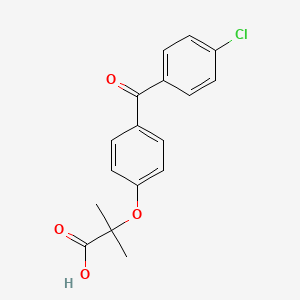


1. 42017-89-0
2. Procetofenic Acid
3. 2-(4-(4-chlorobenzoyl)phenoxy)-2-methylpropanoic Acid
4. 2-[4-(4-chlorobenzoyl)phenoxy]-2-methylpropanoic Acid
5. Trilipix
6. Nsc 281318
7. Fnf Acid
8. Lf 153
9. 2-[4-(4-chlorobenzoyl)phenoxy]-2-methylpropionic Acid
10. Fenofibrate Related Compound B
11. Bgf9mn2hu1
12. Chembl981
13. Nsc-281318
14. Propanoic Acid, 2-(4-(4-chlorobenzoyl)phenoxy)-2-methyl-
15. Chebi:83469
16. Fibricor
17. Lf-153
18. Mfcd00792461
19. Fenofibric Acid-d6
20. 2-{4-[(4-chlorophenyl)carbonyl]phenoxy}-2-methylpropanoic Acid
21. 2-(4-(4-chlorobenzoyl)phenoxy)-2-methylpropionic Acid
22. Propanoic Acid, 2-[4-(4-chlorobenzoyl)phenoxy]-2-methyl-
23. Fenofibricacid
24. Alpha 1081
25. 2-[4-(4-chlorobenzene-1-carbonyl)phenoxy]-2-methylpropanoic Acid
26. Lf 178 Acid
27. Abt 335
28. Ccris 7302
29. Einecs 255-626-9
30. Unii-bgf9mn2hu1
31. Brn 2058973
32. Fenofibric-acid
33. Feno-fibric Acid
34. Fibricor (tn)
35. F5a
36. Fenofibrate Free Acid
37. Fenofibric Acid
38. Schembl16377
39. Gtpl2662
40. Zinc1984
41. Fenofibric Acid [vandf]
42. Dtxsid8041030
43. Bdbm28700
44. Fenofibric Acid [usp-rs]
45. Fenofibric Acid [who-dd]
46. Fenofibrate Free Acid [mi]
47. Amy25229
48. Bcp22437
49. Hy-b0760
50. Fenofibric Acid, Analytical Standard
51. Nsc281318
52. S4527
53. Fenofibric Acid [orange Book]
54. Akos015889489
55. Ccg-213311
56. Db13873
57. Ks-1234
58. Ac-22277
59. Sy052754
60. F1011
61. Ft-0600402
62. D11579
63. D83849
64. Fenofibrate Related Compound B [usp-rs]
65. Fenofibric Acid 100 Microg/ml In Acetonitrile
66. Ab01563028_01
67. 017f890
68. A825720
69. W-106287
70. 2-[4-(p-chlorobenzoyl)phenoxy]-2-methylpropionicacid
71. Q27077290
72. 2-[4-(4-chlorobenzoyl)-phenoxy]-2-methylpropionic Acid
73. 2-[4-(4-chloro-benzoyl)-phenoxy]-2-methyl-propionic Acid
74. 2-[4-(4-chlorobenzoyl)phenoxy]-2-methylpropionic Acid, 95%
75. 2-[4-(4-chlorobenzoyl)phenoxy]-2-methylpropanoic Acid (fenofibric Acid)
76. Fenofibrate Impurity B, European Pharmacopoeia (ep) Reference Standard
77. Fenofibrate Related Compound B, United States Pharmacopeia (usp) Reference Standard
| Molecular Weight | 318.7 g/mol |
|---|---|
| Molecular Formula | C17H15ClO4 |
| XLogP3 | 3.9 |
| Hydrogen Bond Donor Count | 1 |
| Hydrogen Bond Acceptor Count | 4 |
| Rotatable Bond Count | 5 |
| Exact Mass | 318.0658866 g/mol |
| Monoisotopic Mass | 318.0658866 g/mol |
| Topological Polar Surface Area | 63.6 Ų |
| Heavy Atom Count | 22 |
| Formal Charge | 0 |
| Complexity | 405 |
| Isotope Atom Count | 0 |
| Defined Atom Stereocenter Count | 0 |
| Undefined Atom Stereocenter Count | 0 |
| Defined Bond Stereocenter Count | 0 |
| Undefined Bond Stereocenter Count | 0 |
| Covalently Bonded Unit Count | 1 |
| 1 of 3 | |
|---|---|
| Drug Name | FENOFIBRIC ACID |
| Active Ingredient | CHOLINE FENOFIBRATE |
| Company | ACTAVIS ELIZABETH (Application Number: A200920); ALEMBIC PHARMS LTD (Application Number: A208705); ANCHEN PHARMS (Application Number: A201573); IMPAX LABS INC (Application Number: A200264); LUPIN LTD (Application Number: A200750); MYLAN PHARMS INC (Application Number: A200913) |
| 2 of 3 | |
|---|---|
| Drug Name | TRILIPIX |
| Active Ingredient | CHOLINE FENOFIBRATE |
| Company | ABBVIE (Application Number: N022224. Patent: 7259186) |
| 3 of 3 | |
|---|---|
| Drug Name | FIBRICOR |
| Active Ingredient | FENOFIBRIC ACID |
| Company | ARALEZ PHARMS INC (Application Number: N022418. Patents: 7569612, 7741373, 7741374, 7915247) |
For use as an adjunctive therapy to diet to: (a) reduce triglyceride levels in adult patients with severe hypertriglyceridemia, and (b) reduce elevated total cholesterol, low-density-lipoprotein (LDL-C), triglycerides, and apolipoprotein B, and to increase high-density-lipoprotein (HDL-C) in adult patients with primary hypercholesterolemia or mixed dyslipidemia (Fredrickson Types IIa and IIb).
FDA Label
Various clinical studies have shown that elevated levels of total cholesterol, low-desnsity-lipoprotein (LDL-C), and apolipoprotein B (apo B) - an LDL membrane complex - are associated with human atherosclerosis. Concurrently, decreased levels of high-density-lioprotein (HDL-C) and its transport complex, apolipoproteins apo AI and apo AII, are associated with the development of atherosclerosis. Furthermore, epidemiological investigations demonstrate that cardiovascular morbidity and mortality vary directly with the levels of total cholesterol, LDL-C, and triglycerides, and inversely with the level of HDL-C. Fenofibric acid, the active metabolite of fenofibrate, subsequently produces reductions in total cholesterol, LDL-C, apo B, total triglycerides, and triglyceride rich lipoprotein (VLDL) in treated patients. Moreover, such treatment with fenofibrate also results in increases in HDL-C and apo AI and apo AII.
C10AB05
S66 | EAWAGTPS | Parent-Transformation Product Pairs from Eawag | DOI:10.5281/zenodo.3754448
Absorption
Some studies have demonstrated that the bioavailability of fenofibric acid (a sample administration of 130 mg oral suspension to healthy volunteers about 4 hours after a light breakfast) is approximately 81% in the stomach, 88% in the proximal small bowel, 84% in the distal small bowel, and 78% in the colon. Nevertheless, following the oral administration of fenofibric acid in healthy volunteers, median peak plasma levels for the drug occurred about 2.5 hours after administration. Moreover, exposure after administration of three 35 mg fenofibric acid tablets is largely comparable to that of one 105 mg tablet.
Route of Elimination
Fenofibric acid metabolites are largely excreted in the urine.
Volume of Distribution
The volume of distribution for fenofibric acid is demonstrated to be 70.9 +/- 27.5 L.
Clearance
In five elderly volunteers aged 77 to 87, the oral clearance of fenofibric acid after a single oral dose of fenofibrate was 1.2 L/h, which compares to 1.1 L/h in young adults.
In vitro and in vivo metabolism studies reveal that fenofibric acid does not experience significant oxidative metabolism via the cytochrome P450 isoenzymes. The CYP1A2, CYP2A6, CYP2B6, CYP2C8, CYP2C9, CYP2C19, CYP2D6, CYP2E1, and CYP3A4 enzymes are not known to play a role in the metabolism of fenofibric acid. Rather, fenofibric acid is predominantly conjugated with glucuronic acid and then excreted in urine. A small amount of fenofibric acid is reduced at the carbonyl moiety to benzhydrol metabolite which is, in turn, conjugated with glucuronic acid and excreted in urine.
Fenofibric Acid has known human metabolites that include Fenofibryl glucuronide.
S73 | METXBIODB | Metabolite Reaction Database from BioTransformer | DOI:10.5281/zenodo.4056560
Following once daily dosing, fenofibric acid demonstrates an elimination associated with a half-life of about 20 hours after absorption.
Having performed clinical studies with in vivo transgenic mice and in vitro human hepatocyte cultures, it is believed that the principal mechanism of action of fenofibric acid is demonstrated through its capability to activate peroxisome proliferator receptor alpha (PPAR-alpha). By activating PPAR-alpha, fenofibric acid increases lipolysis and the elimination of triglyceride-rich particles from plasma by actuating lipoprotein lipase and reducing production of apoprotein C-III, which acts as an inhibitor of lipoprotein lipase activity. The resultant decrease in triglycerides causes an alteration in the size and composition of low-density-lipoprotein from small, dense particles to large, buoyant ones. The size of these larger low-density-lipoprotein particles have a greater affinity for cholesterol receptors and are therefore catabolized more rapidly. Additionally, fenofibric acid's activation of PPAR-alpha also induces an increase in the synthesis of apoproteins apo A-I, apo A-II, and high-density-lipoprotein. Moreover, the use of fenofibric acid can also act to reduce serum uric acid levels in ordinary or hyperuricemic individuals by increasing the urinary excretion of uric acid.
BUILDING BLOCK



LOOKING FOR A SUPPLIER?